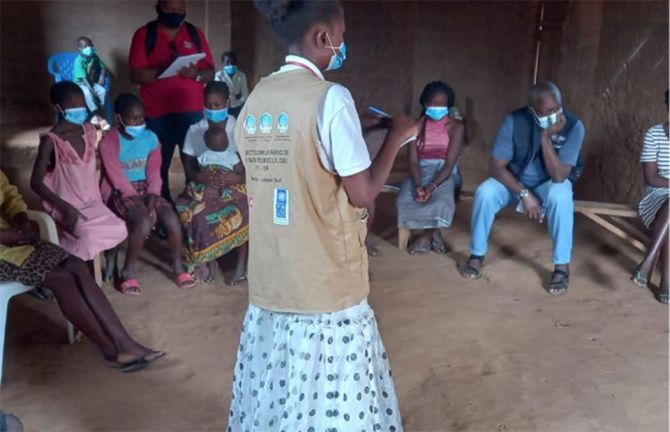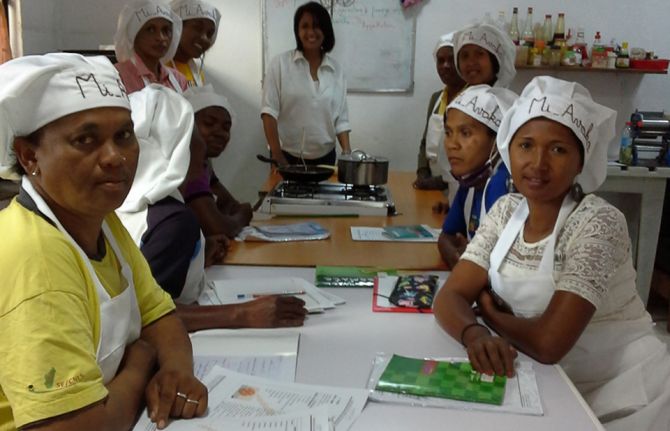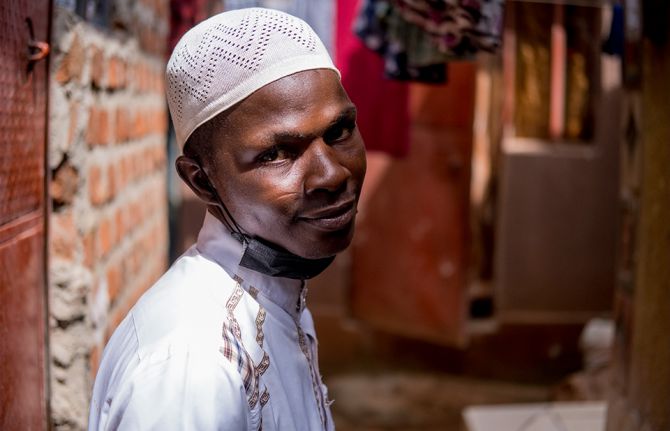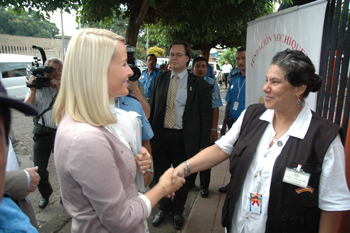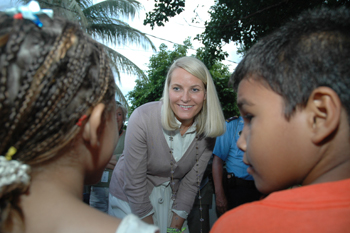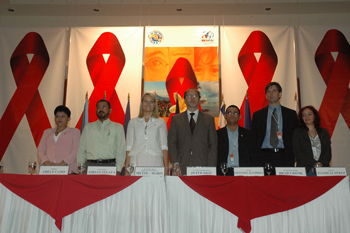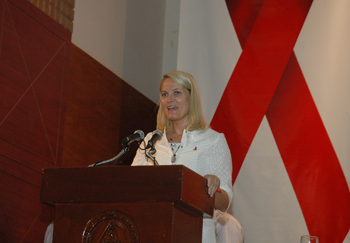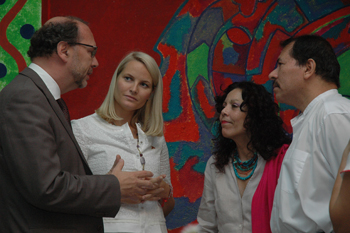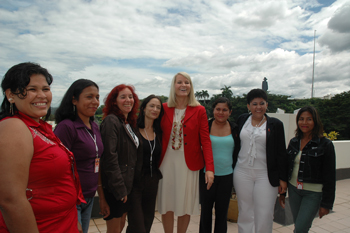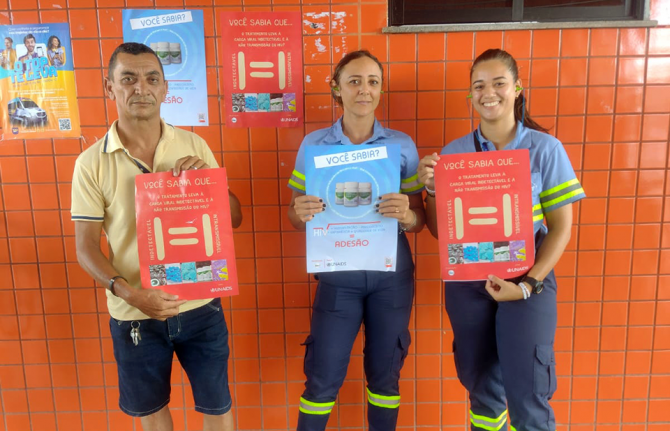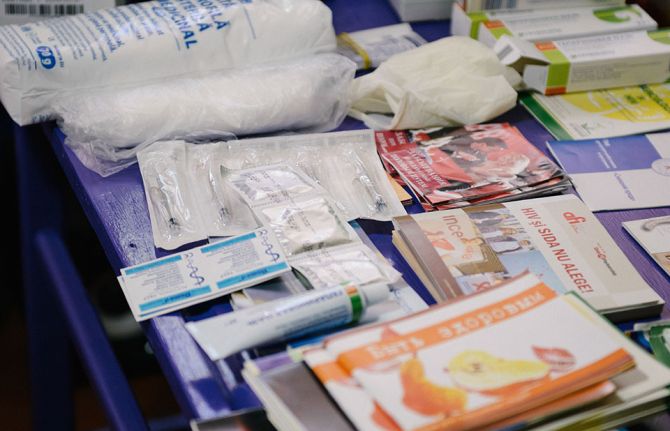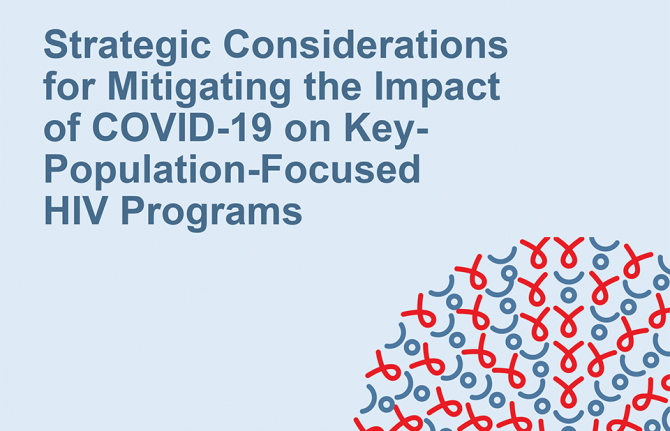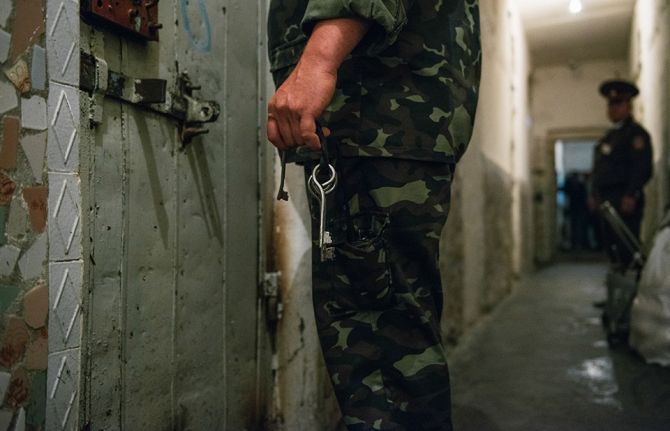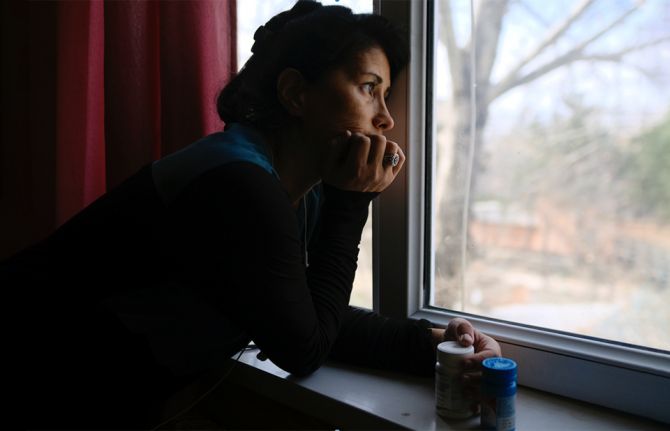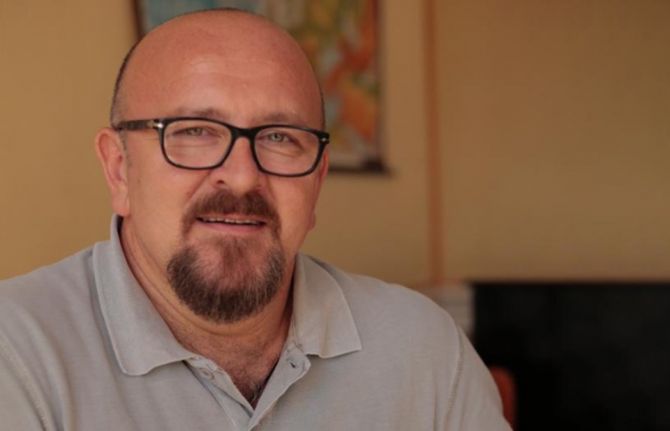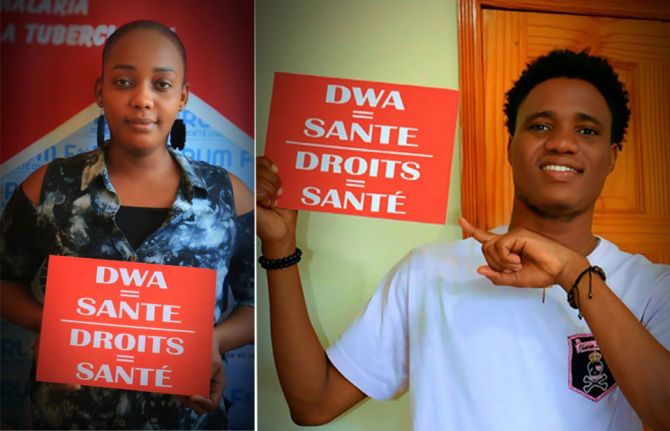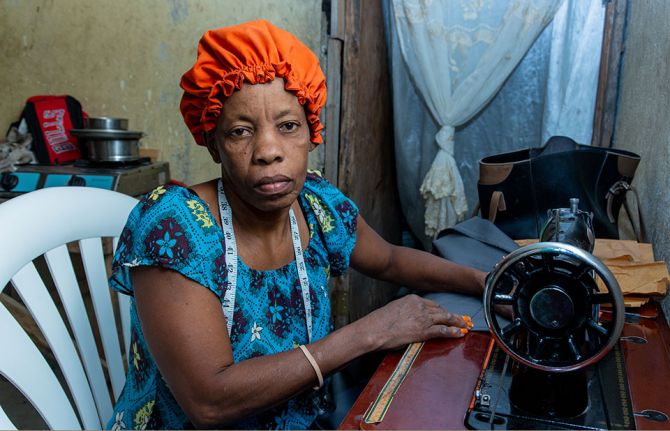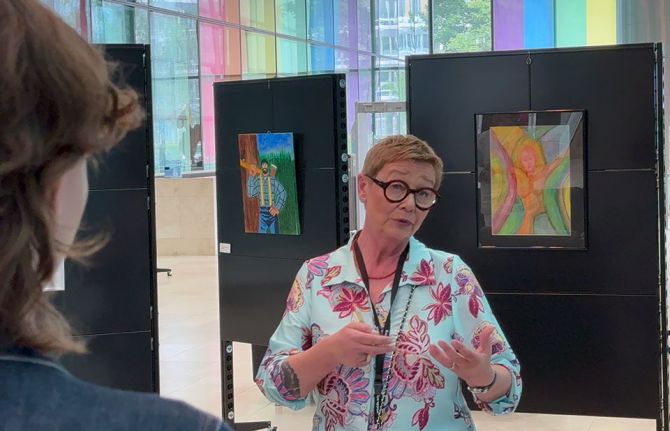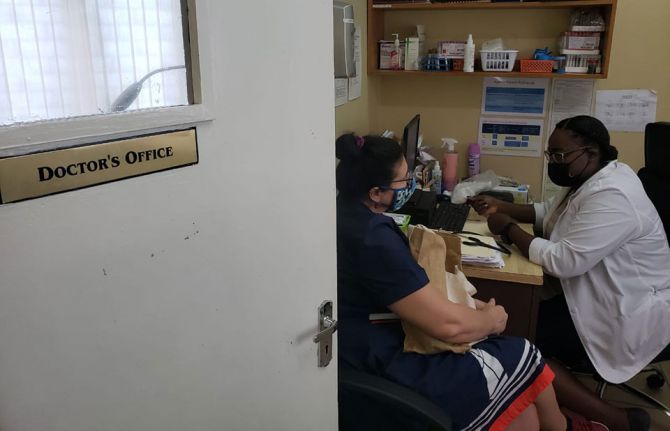
Feature Story
Major TB Conference focuses on HIV
08 novembre 2007
08 novembre 2007 08 novembre 2007
This year’s theme for the 38 th Union
World Conference on Lung Health is
"Confronting the challenges of HIV
and Multi-Drug Resistance in TB
prevention and care”.
Photo credit: P. Virot
More than 3,000 delegates are expected to attend the main annual conference on tuberculosis, which starts today in Cape Town , South Africa . This year’s theme for the 38 th Union World Conference on Lung Health is "Confronting the challenges of HIV and Multi-Drug Resistance in TB prevention and care”. In addition to the focus on HIV, the conference will also deal with other key international lung health-related issues, such as tobacco control, child lung health and asthma.
It is particularly fitting that this year’s conference, with its emphasis on HIV and TB co-infection, is being held in South Africa, a country that is working to deal the medical, health, social and economic consequences of HIV and TB co-infection, in the face of resource constraints and other serious challenges.
The conference is organized by the International Union Against Tuberculosis and Lung Disease and runs through Monday 12 November. Regular reports from the conference, developed in collaboration with Aidsmap, will be posted on the UNAIDS website.
Links:
Visit the conference web site
Go to Aidsmap’s guide to TB and HIV
Visit WHO’s tuberculosis web site
Related

Feature Story
HRH and UNAIDS Special Representative, the Crown Princess of Norway at CONCASIDA
08 novembre 2007
08 novembre 2007 08 novembre 2007As part of an official visit to Nicaragua to learn more about the impact AIDS is having on women, UNAIDS Special Representative, HRH the Crown Princess of Norway visited a grassroots AIDS organisation working on issues of human rights and the sexual and reproductive rights of women and children.
The visit was part of a four-day advocacy mission to the region for the Crown Princess during which she will be engaging with different groups and individuals involved in the AIDS response and participating in events organised at the 5th Central American Congress on AIDS (CONCASIDA).
|
|
HRH and UNAIDS Special Representative, the Crown Princess Mette-Marit of Norway during her arrival to the Xochiquetzal Foundation with the Director of the organization, Mrs. Hazel Fonseca. |
|
|
HRH and UNAIDS Special Representative, the Crown Princess Mette-Marit of Norway sharing with children of the San Jose Oriental Neighborhood during her field visit to the Xochiquetzal Foundation. |
|
|
UNAIDS Executive Director, Dr. Peter Piot and HRH and UNAIDS Special Representative, the Crown Princess Mette-Marit amongst other Officials who participate in opening event of the V Central American Meeting of people living with HIV that took place in Managua as part of the 5th Central American Congress on HIV (CONCASIDA). |
|
|
HRH and UNAIDS Special Representative, the Crown Princess Mette-Marit of Norway, during her speech at the official closing session of the V Meeting of People living with HIV in Managua, Nicaragua. 4 – 9 November 2007. |
|
|
From L to R: UNAIDS Executive Director, Dr. Peter Piot, HRH and UNAIDS Special Representative, the Crown Princess Mette-Marit of Norway, Mrs. Rosario Murillo, Nicaraguan First Lady and Nicaraguan President, Daniel Ortega, during a private meeting in Managua, Nicaragua, in which they share suggestions on the improvement of the HIV response in the Central American region. Nicaragua 4 – 9 November 2007. |
|
|
HRH and UNAIDS Special Representative, the Crown Princess Mette-Marit of Norway during her encounter with ASONVIHSIDA (Nicaragua organization of people living with HIV) leaders. |

Feature Story
Princess of Norway visits grassroots AIDS organization
06 novembre 2007
06 novembre 2007 06 novembre 2007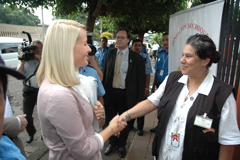
HRH and UNAIDS Special Representative, the
Crown Princess Mette-Marit of Norway during her
arrival to the Xochiquetzal Foundation with the
Director of the organization, Mrs. Hazel Fonseca.
As part of an official visit to Nicaragua to learn more about the impact AIDS is having on women, UNAIDS Special Representative, HRH the Crown Princess of Norway visited a grassroots AIDS organisation working on issues of human rights and the sexual and reproductive rights of women and children.
The visit to Fundación Xochiquetzal was part of a four-day advocacy mission to the region for the Crown Princess during which she will be engaging with different groups and individuals involved in the AIDS response and participating in events organised at the 5th Central American Congress on AIDS (CONCASIDA). The visit aims to raise awareness about how AIDS is increasingly affecting women and girls in Latin America and the Caribbean and to help step up efforts to eliminate the widespread stigma and discrimination against people living with HIV in the region.
During her visit to the foundation, the Crown Princess talked to the group members about her concerns regarding gender inequalities and poverty present in Central America and expressed her support for the foundation’s efforts to raise awareness and educate people about HIV.
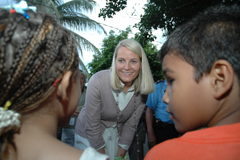
HRH and UNAIDS Special Representative, the
Crown Princess Mette-Marit of Norway sharing with
children of the San Jose Oriental Neighborhood
during her field visit to the Xochiquetzal Foundation.
Fundación Xochiquetzal was created as a non-profit organisation in 1990, and focuses on education and research about HIV, social communication, HIV prevention and care and support for people living with HIV. Programmes are aimed at both young women and men, children and adolescents in situations of commercial sexual exploitation, people living with HIV, sex workers, men who have sex with men, staff of state institutions, non-governmental organizations and the private sector.
HRH the Crown Princess expressed her appreciation the Xochiquetzal Foundation’s work to support people living with HIV and heralded the commitment and professionalism of the members working for the organisation.
She also reiterated the importance of community participation in the AIDS response and called for efforts to help women have a stronger voice and more presence at the leadership level.
More on Fundación Xochiquetzal
During the past 16 years, Fundación Xochiquetzal, has undertaken a wide range of social projects in the cities of Managua, Estelí, Somoto, Ocotal, Jinotega, Matagalpa, Masaya, Granada, Carazo, León y Chinandega.
Xochiquetzal also provides legal advisory support, defending and promoting the human rights of people living with HIV. Its strategy focuses on coordinating and advocating with different sectors in order to promote free sexuality and respect of human rights for people living with HIV, as well as developing studies whose evidence leads to a better perception of risk and behavioural change among target populations in regards to sexually transmitted infections including HIV.
Links:
View photo gallery
More on the V Central American Congress on AIDS (CONCASIDA)
Visit the conference's official web site
Read more on UNAIDS Special Representative, HRH the Crown Princess of Norway

Feature Story
Second meeting of the Americas on AIDS, prisons and confinement
06 novembre 2007
06 novembre 2007 06 novembre 2007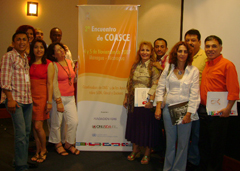
Representatives of governments, civil society and
international organizations from Latin America
attending the meeting
Managua – One of the key meetings taking place in the framework of the V Central American Congress on AIDS (CONCASIDA) was the Second meeting of the Americas on AIDS, prisons and confinement which was held in Managua on 4th and 5th November.
Under discussion were the poor conditions many inmates are facing in prisons across Latin America, exacerbated by the lack of access to health services, dilapidated infrastructure, overcrowding and mistreatment.
The particularly negative effects these conditions are having on inmates who are living with HIV were outlined and participants described how the lack of access to adequate health services contributes to a rapid deterioration in health, affecting both the mental and physical wellbeing of people living with HIV. They also stressed that without proper health care and access to medicines the life expectancy for people living with HIV is often dramatically reduced.
Another important issue discussed at the meeting was how to address the rapid spread of HIV and other sexually transmitted diseases which occur in prisons with inadequate infrastructure and services.
Participants agreed that urgent action is needed to improve the living conditions of people living in prisons in order to reduce their vulnerability to HIV infection.
Regional Director for UNAIDS, Cesar Nunez highlighted the need to strengthen strategies and actions addressing HIV and prisons within the framework of the “Three Ones” principles. He said, “We need to elaborate an action plan that coordinates the efforts of all actors involved in the response to the epidemic in prison settings. We also need to create or strengthen a coordinating body on HIV on a national level and implement a common monitoring and evaluation system at country level, in order to achieve the goal of universal access to HIV prevention, treatment, care and support for all people living with HIV, wherever they are.
Participants were united in their support for joint efforts and agreed that the way forward was for all actors involved in this particular area of the AIDS response to work together to promote effective HIV prevention strategies and advocate for better conditions in prisons.
As part of these efforts the Latin American Institute for the Prevention of Crime and Treatment of Offenders (ILANUD) will act as facilitator in the process and will be advising governments in decision making processes concerning HIV and prisons on behalf of all the groups concerned.
Jose Vila del Castillo, ILANUD Regional Advisor highlighted his commitment to take effective and sustainable action in responding to the AIDS epidemic in the region, particularly for people living in prison settings.
Links:
Read more on HIV and Prisons
American Institute for the Prevention of Crime and Treatment of Offenders (ILANUD)
Related

Feature Story
Concern over Criminalization of HIV Transmission
06 novembre 2007
06 novembre 2007 06 novembre 2007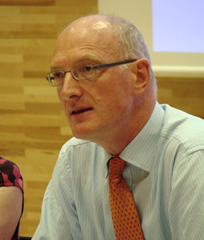
Justice Edwin Cameron, Supreme Court of
Appeal, South Africa highlighted the
importance of public health strategies as an
alternative to the criminalization of HIV
transmission.
Several countries have recently introduced laws to criminalise HIV transmission, or exposing another person to the virus. A number of jurisdictions have used general laws against serious bodily harm in cases where someone is accused of knowingly transmitting HIV or willingly exposing others to HIV transmission.
Subject of controversy, these measures are sparking debate and concern among policymakers, legal and public health professionals, international organizations and civil society, on whether criminal law is applicable in such cases and if such application is accomplishing or damaging public health goals such as universal access to HIV prevention, treatment, care and support.
Addressing these issues, UNAIDS brought together a range of stakeholders in Geneva for a three-day international consultation (31 October – 2 November) to discuss the apparent trend of criminalization of HIV transmission in the context of national responses to AIDS.
The purpose of the consultation, co-hosted by the UNAIDS Secretariat and UNDP, was to foster dialogue and provide an opportunity to reach an understanding of what constitutes appropriate application of criminal law to HIV transmission, if at all, given public health and human rights imperatives. Participants in the meeting included parliamentarians, members of the judiciary, criminal law experts, civil society representatives and people living with HIV, alongside representatives of WHO, ILO and the Office of the UN High Commissioner for Human Rights.
Consultation participants expressed concern about the apparent rise in the number of cases in which people living with HIV have been criminally charged for transmitting HIV, or engaging in acts that risk transmitting HIV. In some cases, criminal charges have been laid for conduct that is “perceived” as risking transmission, but where no real risk exists, and sometimes with very harsh penalties imposed. Participants also expressed concern that there are jurisdictions moving to enact or amend legislation specifically to criminalize transmission and exposure. While noting that many legislators may be acting out of good intentions, consultation participants stated clearly that such laws are not an effective way of dealing with the transmission of HIV.
“Like in the early years of the epidemic when I declared that we have now ‘HIL – Highly Inefficient Laws’, when there were the proposals for testing everyone in society, we now have a new wave of HIL. And it’s a wave that’s coming particularly in Africa, but also in other parts of the world,” stated Justice Michael Kirby, judge in the High Court of Australia, in the concluding session of the consultation.
While little is known about the impacts of criminalizing HIV transmission, many are concerned that it may have a negative impact on the uptake of HIV testing and access to HIV prevention, treatment and care services. Sensational media reports can exacerbate stigma and discrimination, and jeopardize HIV prevention strategies currently in place. “Applying criminal law to HIV transmission has a heightened role in stigmatizing HIV, it is ineffective and public health strategies are better used to advance HIV prevention,” said Justice Edwin Cameron, Supreme Court of Appeal, South Africa.
Furthermore, there is also concern that criminal proceedings may compromise basic civil rights such as the right to privacy, especially among the most vulnerable populations. Some legislators and women’s rights groups think such laws will protect women from HIV infection, but as Susan Timberlake, UNAIDS Human Rights and Law Advisor noted, “There is great concern that in fact these laws would hurt women most, as it is women who first find out their status and thus will be first subject to prosecution. Laws to ensure women’s equality inside and outside marriage would protect them more than laws criminalizing HIV transmission.”
Recommendations from the meeting will inform the finalization of UNAIDS’ policy position and other guidance documents on the criminalization of HIV transmission. “A clear message from the meeting was that criminal law is a very blunt tool to deal with HIV,” said Seema Paul, UNAIDS Chief of Policy Coordination. “The real goal of policy makers is preventing new infections but, in fact, criminalizing HIV transmission – excepting in a very small sub-set of cases dealing with retributive justice – will create disincentives for learning about one’s HIV status and accessing health and other services,” she added.
Links:
Read remarks by Edwin Cameron, Supreme Court of Appeal of South Africa
Read more on HIV and the law
Audio:
Listen to Rama Valayden, Attorney General and Minister of Justice & Human Rights, Republic of Mauritius (mp3, 3.1 Mb)
Listen to Edwin Cameron, Justice of the Supreme Court of Appeal, South Africa (mp3, 1.9 Mb)
Related documents:
International Guidelines on HIV/AIDS and Human Rights
Criminal Law, Public Health and HIV Transmission: a policy options paper
Handbook for Legislators on HIV/AIDS, Law and Human Rights
Report on the ARASA/OSISA Civil Society Consultative Meeting on the Criminalisation of the Wilful Transmission of HIV
Legal Aspects of HIV/AIDS - A Guide for Legal and Policy Reform

Feature Story
CONCASIDA 2007
06 novembre 2007
06 novembre 2007 06 novembre 2007The impact of HIV in Central America: The United Nations Report
United Nations agencies and programs are committed to taking all the necessary measures to intensify Central America’s response to the HIV epidemic. This announcement was made by the Regional Directors for Latin America and the Caribbean of UNAIDS and UNICEF, participating in the 5th Central American Congress on HIV – CONCASIDA 2007.
Read press release ( en | es )
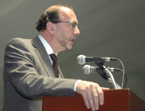
UNAIDS Executive Director's opening speech
UNAIDS Executive Director Dr Peter Piot gave one of the key note speeches at the official opening ceremony of CONCASIDA. During his speech he highlighted the need to deal with the tough issues that lie at the core of the AIDS epidemic in Central America and called for strong and exceptional leadership on AIDS.
Read UNAIDS Executive Director's opening speech ( en | es )
Listen to UNAIDS Executive Director's opening speech (mp3, 2.2 Mb, recorded on location)
View photo gallery

Princess of Norway visits grassroots AIDS organization
As part of an official visit to Nicaragua to learn more about the impact AIDS is having on women, UNAIDS Special Representative, HRH the Crown Princess of Norway visited a grassroots AIDS organisation working on human rights and the sexual and reproductive rights of women and children.
Read more
View photo gallery
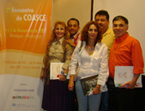
Second meeting of the Americas on AIDS, prisons and confinement
One of the key meetings taking place in the framework of the V Central American Congress on AIDS (CONCASIDA) was the Second meeting of the Americas on AIDS, prisons and confinement which was held in Managua on 4th and 5th November. Read more

CONCASIDA 2007
The 5th Central American Congress on HIV is being held in Managua, Nicaragua, from 4-9 November. Over 1,500 participants are expected to attend the Congress including representatives from governments, the United Nations, people living with HIV, women’s organizations, religious groups and the private sector. Read more
CONCASIDA 2007
Links:
Visit the conference's official web site
Read press release - The V Central American Congress on AIDS comes to a close ( es )
Read press release - The impact of HIV in Central America: The United Nations Report ( en | es ) (08 November 2007)
Read press release - The V Central American Congress on STI, HIV and AIDS opens in Nicaragua ( en | es ) (04 November 2007)
Read UNAIDS Executive Director's opening speech ( en | es )
Read the San Salvador Declaration
Read more on Latin America
Photo Gallery:
View UNAIDS Executive Director's photo gallery
View HRH and UNAIDS Special Representative, the Crown Princess of Norway's photo gallery

Feature Story
CONCASIDA 2007 in Nicaragua
05 novembre 2007
05 novembre 2007 05 novembre 2007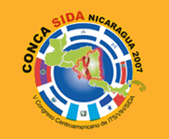
One of the main aims of the Congress
will be to evaluate the progress made
on the ‘San Salvador declaration’
The 5th Central American Congress on HIV (CONCASIDA) is being held in Managua, Nicaragua, from 4-9 November.
The 1,500 participants attending the congress include Dr Peter Piot, Executive Director of UNAIDS, UNAIDS Special Representative HRH the Crown Princess of Norway, people living with HIV, regional Health Ministers, representatives from civil society, women’s organizations, religious organizations and the private sector. Dr Piot will give a keynote speech during the official inauguration ceremony.
As well as a strong focus on scientific developments, sharing lessons learnt and best practices, one of the main aims of the Congress will be to evaluate the progress made on the ‘San Salvador declaration’—a commitment signed in November 2005 by seven Central American countries pledging to ensure that AIDS is included as a high priority on regional agendas.
Other meetings taking place within the framework of CONCASIDA include the Council of Central American Health Ministers who will meet to discuss policies and strategies to strengthen the AIDS response in the region and the 5th Central American Meeting of People Living with HIV which is being held over two days and where participants will share experiences and debate on issues pertinent to the AIDS response including human rights, children, stigma and discrimination, gender, sexual diversity, nutrition, communication and ethics.
The CONCASIDA congress will provide an important platform for discussion on AIDS in the region ahead of the 2008 International AIDS Conference which will take place in Mexico City in August next year.
Links:
Read press release ( en | es )
Read the San Salvador Declaration
Visit the conference's web site
Read more on Latin America

Feature Story
Traduire les connaissances sur le sida
31 octobre 2007
31 octobre 2007 31 octobre 2007
D'abord ciblé sur la traduction du contenu du site web
de l'ONUSIDA dont la version multilingue a été lancée
en 2008, ce partenariat joue un double rôle :
en plus de fournir à l'ONUSIDA des traductions de
grande qualité, il offre aux étudiants de l'université
une opportunité unique de travailler sur les documents
des Nations Unies actuels « en temps réel ».
Preuve a été faite que les individus comprennent et retiennent mieux les informations lorsqu'elles sont rédigées dans leur propre langue. Ainsi, quand il s'agit d'atteindre le plus grand nombre de personnes possible avec des connaissances et des informations concernant le sida, il est impératif de mettre à disposition ces contenus dans un large choix de langues.
C'est la raison pour laquelle l'ONUSIDA fait traduire ses documents, rapports et autres formes de contenus dans ses quatre langues de travail officielles, à savoir l'anglais, le français, l'espagnol et le russe.
Afin de développer encore davantage sa communication multilingue et ses capacités de sensibilisation, l'ONUSIDA a conclu en 2005 un partenariat avec la Faculté de Traduction et de Documentation de l'Université de Salamanque, en Espagne, pour élaborer de nouveaux moyens de développement de la communication sur le sida en espagnol, cette langue employée par 370 millions de personnes sur la planète étant la troisième langue la plus parlée au monde.
D'abord ciblé sur la traduction du contenu du site web de l'ONUSIDA dont la version multilingue a été lancée en 2008, ce partenariat joue un double rôle : en plus de fournir à l'ONUSIDA des traductions de grande qualité, il offre aux étudiants de l'université une opportunité unique de travailler sur les documents des Nations Unies actuels « en temps réel » et de prendre mieux conscience en même temps de la problématique du sida. De cette façon, le partenariat joue un rôle de sensibilisation auprès des jeunes, en les aidant à comprendre la dynamique de l'épidémie dans les différentes régions du monde et en contribuant à réduire la stigmatisation et la discrimination.
Le Dr Jesús Torres del Rey, coordonnateur du projet de partenariat et Vice-doyen de la Faculté de Traduction et de Documentation de l'Université de Salamanque, évoque pour www.unaids.org les avancées réalisées à ce jour et les bénéfices d'un tel partenariat.
Q. Comment fonctionne le partenariat de traduction ?
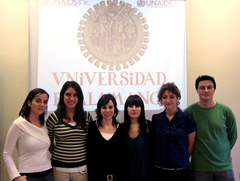
Les étudiants eux-mêmes sont désignés pour coordonner
tout le projet. Une fois terminé, le travail des étudiants
est encore une fois révisé et coordonné par le personnel
de la faculté.
R. Dans le cadre de leur cursus, les étudiants ont la possibilité de choisir parmi une large variété de véritables travaux pratiques de traduction (stages ou « prácticas »). Pour ce partenariat, nous avons décidé de faire de la traduction des contenus du site web de l'ONUSIDA l'un de ces « prácticas », qui est d'ailleurs devenu l'un des plus populaires. Nous recevons les documents de l'ONUSIDA en anglais puis les étudiants travaillent ensemble pour les traduire avant de se relire mutuellement. Les étudiants eux-mêmes sont désignés pour coordonner tout le projet. Une fois terminé, le travail des étudiants est encore une fois révisé et coordonné par le personnel de la faculté. En parallèle aux sessions pratiques, des séminaires spéciaux de 2 mois sont organisés, au cours desquels d'autres textes de l'ONUSIDA sont traduits sous la supervision directe d'un maître de conférences. Tout au long du projet, des délais stricts et des procédures de qualité doivent être respectés par les étudiants, ce qui rend leur tâche aussi semblable que possible aux conditions de travail réelles. L'an dernier, notre projet a bénéficié de fonds de l'AECI, l'Agence espagnole de Coopération internationale, qui fait partie du Ministère des Affaires étrangères. Ceci nous a permis d'acquérir une partie du matériel et des logiciels nécessaires et de fournir d'autres ressources aux étudiants qui travaillent sur ce projet.
Q. Quels sont les avantages pour les étudiants et comment cela peut-il contribuer à la préparation de leur carrière de traducteur professionnel ?
R. Les avantages sont nombreux. Les étudiants travaillent sur des documents authentiques « en temps réel » avec un objectif très clair et utilisent une méthodologie similaire à celle des environnements professionnels, tout en apprenant des choses sur le travail d'une organisation internationale. Non seulement ils effectuent une tâche professionnelle, mais ils contribuent également à la sensibilisation aux messages et aux activités de l'ONUSIDA. Ce partenariat est aussi une source de fierté et de prestige pour l'université et pour les étudiants eux-mêmes.
Q. Outre le travail de traduction réalisé au sein de la faculté, le partenariat implique également les étudiants dans un projet de recherche terminologique : comment fonctionne-t-il et pourquoi est-ce important ?
R. Un bon travail de terminologie en amont et en parallèle au travail de traduction est capital, car tous les traducteurs doivent utiliser des termes spécifiques qui ont été validés par des experts pour des concepts et des situations spécifiques. Pour l'ONUSIDA, il s'agit de mots et de termes en lien avec le sida, aussi bien sur le plan médical que dans un contexte social beaucoup plus large. Les mots peuvent avoir différentes significations selon les situations, de sorte qu'il est essentiel de les placer dans un contexte en plus d'en donner une définition. Nous devons également nous assurer que les idées derrière ces termes et les relations sémantiques entre eux sont clairement compréhensibles par l'ensemble des locuteurs hispanophones dans le monde.
Pour le projet de recherche terminologique, nous commençons par étudier les textes et les traductions, puis nous extrayons des termes spécifiques et nous les entrons dans le logiciel de terminologie. Dans le même temps, nous créons des schémas conceptuels qui nous permettent de gérer toutes les informations. Le point crucial ici est d'être capable d'échanger des informations avec les experts linguistiques de l'ONUSIDA et d'autres responsables concernant les concepts, leur usage, etc. et d'accéder aux documents et publications effectifs de l'ONUSIDA pour extraire le contexte dans lequel ces mots sont employés.
Q. Comment le partenariat entre l'ONUSIDA et l'Université de Salamanque va-t-il se poursuivre et s'étendre ?
R. Notre objectif est d'être en mesure de bâtir une solide plate-forme d'échange pour la communication, la terminologie et la traduction. Le but principal est de pouvoir rendre le flux d'information aussi automatique que possible pour permettre aux étudiants, au personnel de l'ONUSIDA et aux utilisateurs de ces informations d'accéder à des informations opportunes et précises générées par l'ONUSIDA.

Feature Story
PANCAP: AIDS in the long-term
31 octobre 2007
31 octobre 2007 31 octobre 2007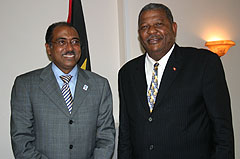
Prime Minister of Antigua and Barbuda, the
Honorable Winston Baldwin Spencer with UNAIDS
Deputy Executive Director, Michel Sidibe
Addressing some hundred participants, Sidibe said AIDS has become a defining issue of our time. “We are really in the turning point in my point of view. It is important for us to not to just deal with this pandemic like if it is just about managing a short term crisis, it is time for us to look at how we can really think about long term sustainable approach to deal with this pandemic,” he said.
In order to meet that challenge, Sidibe reinforced the urgent need for countries to turn commitments into action by setting and achieving targets for universal access to HIV prevention, treatment, care and support services for all those in need. Resonating strongly with the theme of the PANCAP meeting— Universal Access by 2010: Ensuring Success—the UNAIDS Deputy Executive Director maintained that the greatest legacy to future generations would be the attainment of this critical goal.
Taking into account new factors such as the increasing numbers of women becoming infected with HIV, growing stigma and discrimination, and the lack of capacity to get treatment to all those in need, Sidibe said action must be accelerated. “We need to quicken the pace of action,” he said.
Established in 2001, PANCAP is the regional mechanism responsible for coordinating the Caribbean’s response to the HIV epidemic. It is based in the Caribbean Community (CARICOM) Secretariat, in Georgetown, Guyana. The PANCAP Annual General Meeting is an important regional event in the Caribbean bringing together the principal leaders in the AIDS response in this Region.
Mr Sidibe, on his first trip to the Caribbean in his capacity as UNAIDS Deputy Executive Director and Under Secretary General of the UN, also met with various leaders and UNAIDS partners in the Caribbean region. These included: Prime Minister of Antigua and Barbuda, the Honorable Winston Baldwin Spencer, Antigua’s Minister of Health, John Maginley, Assistant Secretary General of CARICOM, Dr Edward Greene, Chairman of the Barbados National HIV/AIDS Commission and former Chair of the Global Fund, Dr Carol Jacobs, Belize AIDS Ambassador, Dolores Balderamos Garcia and Dr James St Catherine of the Organization of Eastern Caribbean States. Commending all for their exemplary leadership shown in working to expand the AIDS response and achieve universal access both nationally and regionally, Sidibe pledged increased UNAIDS technical support and assistance to further strengthen efforts.
The Caribbean region is the second most affected by AIDS after sub-Saharan Africa. An estimated 250,000 people are living with HIV in the region, more and more of them women. In 2006 there were 27,000 reported new HIV infections.
Links:
Visit the PANCAP web site
Visit the CARICOM web site

Feature Story
AIDS, poverty and human development
31 octobre 2007
31 octobre 2007 31 octobre 2007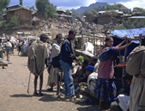
HIV strategies work best when there is a clear understanding of the relationship between AIDS, poverty and human development. In an article published in leading scientific magazine PLoS, UNAIDS examines this relationship and the often called ‘vicious circle’ within which the impacts of AIDS increase poverty and social deprivation, while socio-economic inequalities increase vulnerability to HIV infection.
Links:
Read article - Squaring the Circle: AIDS, Poverty, and Human Development
Read presentation - HIV and development challenges for Africa

